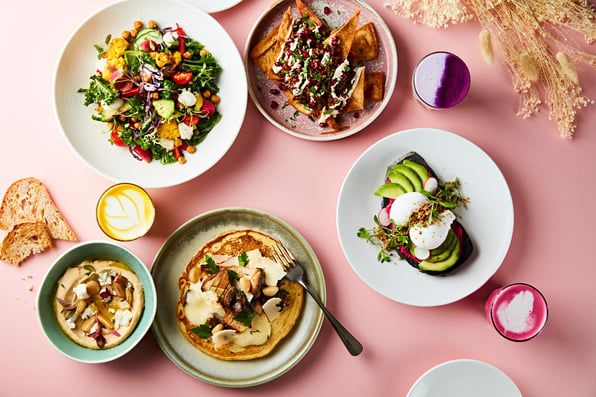Vibrant cities are defined by the experiences they offer, and increasingly, those experiences revolve around food. F&B Masterplanning is now a critical driver of urban success, shaping not only what we eat but how we live, connect, and experience our cities.
Strategic F&B planning goes beyond simply filling spaces with restaurants; it’s about developing a dynamic and appealing culinary sector that contributes to urban enrichment, promotes economic prosperity, and strengthens place identity.
Activating New Urban Areas

Strategic integration of dining options from the outset allows developers to attract diverse demographics, generate immediate consumer interest, and create sought-after destinations.
When executed effectively, this strategy also becomes a major cost-saver by enabling new communities and microeconomies to thrive sooner—eliminating the need for later-stage investments to drive traffic and stimulate commercial viability.
One standout example of this in action can be found at the Wharf in Washington D.C. This purposefully designed mixed-use development featuring a curated mix of Retail, Dining and Entertainment (RDE) venues has been widely recognised for transforming a previously underutilised waterfront into a commercially successful and thriving community hub.
In the case of Expo City Dubai, we also saw how strategic food and beverage initiatives proved crucial—not only in driving the success of one of the largest international events spanning six months but also in transforming this newly conceived giga project into a diverse, fully functioning city. This evolution has effectively established an entirely new neighbourhood within Dubai's expansive urban landscape.
In recent years, modular F&B solutions such as container parks and food truck parks have also achieved remarkable success.
These initiatives are strategically planned with a keen focus on brand curation, ensuring that each location offers a unique and engaging mix of culinary experiences. For instance, food truck parks along the GCC coastline—like the one at Kite Beach in Dubai—have transformed underutilised spaces into vibrant hubs that foster community connections and promote casual dining.
Similarly, dynamic concepts like Boxpark have flourished, expanding from London to Dubai. By offering a rotating mix of brands and concepts, these spaces showcase local chefs and a diverse range of cuisines, not only delivering an exciting culinary experience but also supports small businesses and drives culinary innovation, all within a relaxed, inviting setting.
Revitalising Existing Communities

Strategic F&B Masterplanning is also key to breathing new life into existing urban areas and communities.
London’s Borough Market, one of the city’s oldest marketplaces, has undergone a remarkable transformation through targeted F&B Masterplanning. Once primarily a wholesale market, it has evolved into a vibrant culinary hub by curating a diverse selection of high-quality, locally sourced, and artisanal food vendors.
Strategic initiatives such as the ‘Young Marketeers’ programme, which engages local schools in sustainable food practices, and a commitment to sustainability through waste reduction and environmentally friendly operations have reinforced its role as a modern gastronomic landmark. Additionally, flexible vendor spaces, experiential dining options, and chef-led events have enhanced the market’s appeal, drawing both locals and tourists while preserving its historical character.
Dubai’s urban landscape has been elevated by the strategic integration of F&B, creating vibrant destinations that offer unique experiences.
From the trendy, open-air lifestyle hub of Boxpark where repurposed shipping containers house a diverse mix of retail and dining, to the culturally immersive Alserkal Avenue, a repurposed industrial area now a hub for art and creativity, featuring independent galleries and innovative F&B concepts, Dubai demonstrates how culinary offerings can be a catalyst for urban revitalisation resonating with diverse communities.
This model of revitalisation is showcased in other parts of the region, such as Saudi Arabia’s Jeddah, where the restored heritage buildings of the Al Balad district have been repurposed to house restaurants that showcase authentic Saudi cuisine. These initiatives underscore the transformative potential of blending strategic F&B elements with urban redevelopment.
Transforming Malls and Hotels through F&B
.jpg?width=9485&height=6323&name=GavriilPapadiotis_AlMamlaka_20231109_059_4mb%20(1).jpg)
Within the context of malls and hotels, the same principles of strategic F&B apply.
For instance, The Kingdom Centre mall has redefined its retail environment by introducing Al Mamlaka Social Dining. This thoughtfully curated concept not only enhances the mall’s culinary offerings but also deepens visitor engagement, creating an experiential layer that complements the existing retail mix and drives increased foot traffic.
Hotels, too, are leveraging creative F&B strategies to elevate guest experiences and reinforce their brand promise. Modern properties are integrating artisanal dining, pop-up culinary events, and themed social dining experiences that serve as unique in-house destinations for both guests and locals.
By transforming the hotel space into a dynamic environment where hospitality meets lifestyle, these initiatives foster community engagement beyond traditional accommodation services.
Timeout Market at Dubai Mall is another example of this trend. Located within one of the world's largest shopping destinations, Timeout Market brings a curated selection of global and local culinary offerings to a high-traffic environment. Its presence not only enriches the mall's dining portfolio but also creates a vibrant social hub that enhances the overall retail experience.
Together, these examples demonstrate how strategic F&B integrations can bridge the gap between retail, culture, and hospitality—ultimately driving sustained consumer interest and fostering economic growth.
The strategic integration of food and beverage is unequivocally a crucial driver of urban success, demonstrably transforming our cities from large-scale developments like the Wharf and Expo City Dubai to the revitalisation of established communities like Borough Market and the creative reimagining of spaces like Alserkal Avenue.
A vibrant F&B scene is quintessential for a city’s economic health, contributing to job creation, increased tourism, and enhanced property values, making it vital for urban planners and developers to prioritise strategically incorporating diverse and innovative F&B concepts into sustainable urban development initiatives.
-1.png?width=3330&height=698&name=TGP%20International%20Logo%20White%20(1)-1.png)



